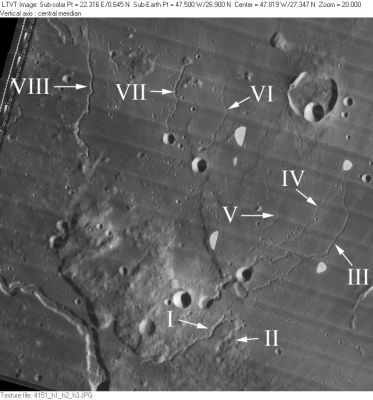Difference between revisions of "Aristarchus Rilles"
| Line 2: | Line 2: | ||
=Aristarchus Rilles= | =Aristarchus Rilles= | ||
''(unofficial name; official [[IAU|IAU]] name: '''Rimae Aristarchus''')''<br /> <div id="toc"> | ''(unofficial name; official [[IAU|IAU]] name: '''Rimae Aristarchus''')''<br /> <div id="toc"> | ||
| − | + | ||
| − | |||
{| class="wiki_table" | {| class="wiki_table" | ||
| | | | ||
| Line 33: | Line 32: | ||
<br /> | <br /> | ||
---- | ---- | ||
| − | + | </div> | |
Revision as of 16:13, 15 April 2018
Contents
Aristarchus Rilles
(unofficial name; official IAU name: Rimae Aristarchus)|
Lat: 26.9°N, Long: 47.5°W, Length: 121 km, Depth: km, Rükl: 18 |
Lunar Orbiter IV-151H This image shows the region of the Aristarchus Rilles from Schröter's Valley (in the lower left) to Krieger (in the upper right). The Roman numerals indicate the named components of Rimae Aristarchus shown on the System of Lunar Craters Quad Maps and LAC-39.
Images
LPOD Photo Gallery Lunar Orbiter Images Apollo Images Kaguya HDTV
Maps
(LAC zone 39A4) LAC map Geologic map LM map LTO map
Description
Description: Elger
(IAU Directions) The mountain plateau N. of Aristarchus deserves careful scrutiny, as it abounds in detail and includes many short clefts.
Description: Wikipedia
Additional Information
Nomenclature
- Named after the nearby crater. (Aristarchus)
- Numbers 60, 61, 62, 64, and 69 in Debra Hurwitz's Atlas and Catalog of Sinuous Rilles.
- The original IAU nomenclature of Blagg and Müller (1939) seems to have included three Roman-numeralled "clefts" associated with Aristarchus, although the Army Map Service's LTM map series identifies the position of only one of these -- Aristarchus III -- which seems to correspond to the deep groove above and to the right of the Roman numeral I label in the Lunar Orbiter image at the top of this page (between the craters now known as Väisälä and Aristarchus B). In the early 1960's, the IAU-sanctioned revisions of the System of Lunar Craters and LAC map series increased the number of named components to eight (as illustrated in the Lunar Orbiter image at the top of this page) and Latinized the name of the overall system to Rimae Aristarchus. However, in 1973 the IAU declared its intention to assign rimae "new and more appropriate designations" (IAU Transactions XVB). It is unclear if the IAU's Roman-numeralled designations shown here remain operative pending the promised renaming, which seems never to have happened.
LPOD Articles
Bibliography
- Apollo Over The Moon; A View From Orbit, Chapter 6: Rimae (Part 1: Sinuous Rimae), Figures 192, 193, and 194 (part of Rimae Aristarchus/ Rimae Prinz near Krieger).
